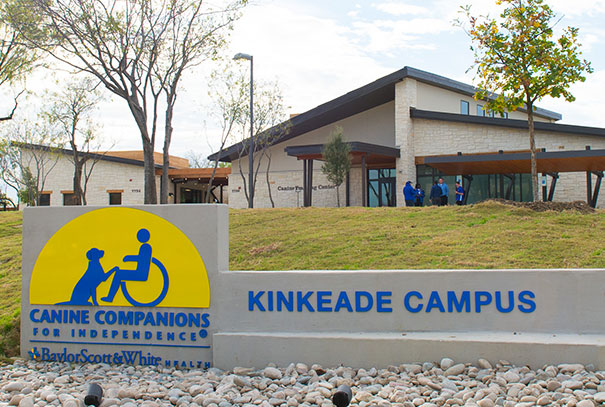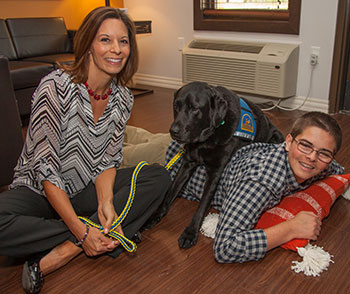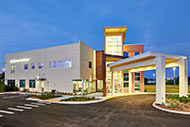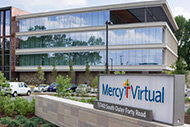 |
|
Baylor Health Care System Foundation / Lara Bierner The campus serves veterans and patients with physical and developmental disabilities and has the capacity to graduate up to 60 dog and recipient teams per year. |
The Canine Companions for Independence at Baylor Scott & White Health–Kinkeade Campus, Irving, Texas, takes population health to another level with the opening of the first assistance-dog training center campus in the nation that is connected to a health care system.
The campus will provide highly trained assistance dogs and ongoing support cost-free to children, veterans and others with physical and developmental disabilities and who would benefit from an assistance dog. The new campus eventually will be able to graduate up to 60 dog and recipient teams per year.
 |
|
Baylor Health Care System Foundation / Lara Bierner Patients stay in private residences on campus during the two-week training process. |
 |
|
Baylor Health Care System Foundation / Lara Bierner Adam, 14, of Southlake Texas pictured with their skilled companion dog. Adam has autism and relies on his black Labrador retriever, Tyler, to help him. With the crash command, Tyler puts pressure on Adam’s back, helping him calm down after a long day at school. |
The nine-acre campus includes indoor and outdoor training areas, dormitory rooms, kennels, a veterinary clinic and a grooming area. Central to campus is a training center that serves as the primary entrance and common space for participants, staff, visitors and dogs in training.
Built with flexibility in mind, the center comprises two training buildings joined by an arbor-style, wood-covered breezeway, landscaped with lush vines and native plants. It combines the natural surroundings of the campus site, while balancing light and openness.
Those who attend the two-week team training will stay in one of two cabins, which provide a respite for participants and their families. One cabin will house four full-size residential bedrooms complete with private outdoor patio space and the second will house two full-size residential bedrooms, also with private outdoor patio space.
Special accommodations in each cabin provide an electronic reclining/declining medical bed and wheelchair lift for participants with physical disabilities. The cabins can accommodate more than six individuals and their families during a team training session.
In addition, a residential apartment provides accommodations for a full-time resident assistant to live on campus year-round.
The facility will train three types of assistance dogs, including service dogs that assist adults with physical disabilities by performing daily tasks; skilled companions that enhance independence for children and adults with physical, cognitive and developmental disabilities; and facility dogs that work with a professional handler in a visitation, education, criminal justice or health care setting.
"We have a long history of innovation and collaboration, and we are proud to add this moment to that history," says Joel Allison, CEO, Baylor Scott & White Health of the new training center.
"We are now the first health care system in the country to open a facility like Kinkeade Campus. This is another example of how we're working to take care of the total patient — it's part of our population health mission," he says.
The center was designed by t. howard + associates architects, a Dallas-based firm specializing in health care and educational environments. CBRE, Los Angeles, led project management and Medco Construction, Dallas, served as the general contractor for the project, which began November 2014.
Canine Companions for Independence provides highly trained assistance dogs to children and adults with disabilities and has training centers across the country.
In other health care facility news:
-
Rush University Medical Center, Chicago, recently unveiled plans to build a $500 million outpatient center and redevelopment of existing facilities as part of its ongoing campus expansion and renovation.
Detailed planning for the campus redevelopment, expected to be completed next year, will include architectural, engineering and design work and will involve employee, physician and community input. Final plans and expenditures will require state regulatory agency approval before construction begins.
The new nine-story, 620,000-square-foot outpatient tower would be the second major structure built as part of Rush's plan to upgrade its campus. The first structure, a $683 million patient tower distinctive for its butterfly shape, started accepting patients in January 2012.
-
Trinity Mother Frances Hospitals (MFH) and Clinics broke ground Friday in Tyler, Texas, for a 41,200-square-foot community hospital.
MFH South Tyler will include a comprehensive emergency department, inpatient beds, advanced imaging and diagnostic laboratory services. The second level will house an imaging center with the latest in technology, and the third floor will comprise an ambulatory service center with a complement of five operating room suites.
-
Cancer Treatment Centers of America at Midwestern Regional Medical Center celebrated the recent opening of new six-story, 168,078-square-foot, $84 million inpatient tower in Zion, Ill.
The expansion offers 72 innovative, single-occupancy inpatient oncology rooms and common space designed to bring comfort to patients.
The amenities tower includes tranquil family lounges, a secure and spacious outdoor courtyard and garden, a large patient bistro and dining hall, and a state-of-the-art culinary demonstration kitchen where patients and caregivers learn healthy cooking strategies and more.
Please email new health care construction project information and photos to Senior Editor Jeff Ferenc or tweet him @JeffFerenc for an opportunity to be featured on HFM Today.





